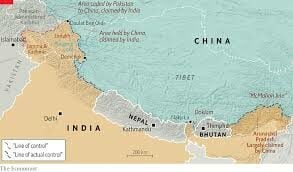Beijing has billed Foreign Minister Wang Yi’s visit to New Delhi this week as an effort to “enhance political mutual trust”.
Wang, who is also a member of the Political Bureau of the CPC Central Committee and China’s Special Representative on the boundary question, arrived on August 18 to participate in the 24th round of Special Representative (SR) talks with National Security Advisor Ajit Doval, post a meeting with External Affairs Minister S Jaishankar.
The trip marks the first state visit by a Chinese minister to India since PM Narendra Modi and President Xi Jinping met on the sidelines of the Kazan summit in 2024. Importantly, the visit is arguably one of the most substantive engagements since the Galwan clash of June 2020, which collapsed the old bargain of managing competition while building cooperation.
Successive statements from the Ministry of External Affairs (MEA) have reiterated this uncompromising stance that is both strategic and reputational: relationship normalisation is impossible without “respect for the LAC”.
Despite the continued deployment of tens of thousands of troops along the frontier, External Affairs Minister S. Jaishankar set a clear agenda in his meeting with Wang Yi soon after the latter’s arrival. While reaffirming that the de-escalation process along the border must move forward, he broadened the discussion to encompass critical priorities: managing economic and trade ties, facilitating pilgrimages and people-to-people exchanges, improving river data sharing and border trade, and restoring connectivity and bilateral exchanges. Jaishankar also situated the dialogue within the larger “global situation,” underscoring India’s stake in a multipolar order and the need for stability in an uncertain international environment.
India’s evolving diplomatic lens on China
The visit is much more than symbolism. As Prime Minister Narendra Modi prepares to attend the Shanghai Cooperation Organisation (SCO) summit in Tianjin later in the month, his potential visit gains momentum as a landmark in its own right, marking the Indian PM’s first visit to China in seven years.
For Beijing, Modi’s presence at the SCO offers a chance to restore at least a veneer of normalcy in bilateral relations, which is useful at a time when China faces economic headwinds and rising hostility across the West. Similarly, Wang Yi’s trip to Delhi serves as a way to frame the forthcoming encounter on its terms, acting as an agenda-setter for Tianjin, and sends a message to the US concurrently, amid President Trump’s 50% tariffs on India for buying Russian oil.
In his SR meeting with FM Wang, NSA Doval stated that India-China relations are seeing an “upward trend” with “new energy and momentum”. He further commented that the border “has been quiet”, referring to a lack of further clashes even as troop placement remains. Chinese FM Wang, in his remarks, reflected similar sentiments, stressing that India-China should be “partners, not adversaries”.
Such optimism was supported by China’s announcement of lifting export restrictions on fertilisers, rare-earth minerals and tunnel boring machines to India. By warming the frost with Beijing with the world watching amid the tariff spat with Washington —and in the immediate aftermath of Trump’s meeting with Russia’s Putin in Alaska —Delhi is subtly reminding the US that pressure, whether over Russian energy or trade frictions, could nudge India to visibly deepen dialogue with China.
This does not mean a strategic alignment with Beijing; rather, it signals to the US that India’s room for manoeuvre widens when Washington squeezes too hard. It is a signal of strategic autonomy, not strategic drift.
However, what Wang himself dubbed the “Dragon-Elephant Tango” in his July 2025 meeting with Jaishankar, for Delhi, is emblematic of Beijing’s playbook: managing fraught ties in the language of civilizational harmony, multipolarity, and shared destiny. In a post-Galwan Delhi, such formulations ring hollow. Behind the metaphor of two great civilisations dancing in sync, Indian policymakers see a choreography that obscures asymmetry—one where China continues border provocations via new infrastructure buildup, shields Pakistan diplomatically, and can leverage economic dependency as coercion. For India, then, the so‑called “tango” evokes less an elegant pas de deux than a wary sparring match, where every step forward is tested against the hardened scepticism that has defined Delhi’s China policy since Galwan.
Leveraging rapprochement
Despite erosions of trust, the current deduction remains that both sides are attempting a phase of tactical recalibration. For Beijing, the timing matters: it cannot afford to be locked in simultaneous hostility with its two largest Asian neighbours, India and Japan. Tensions with Tokyo have already spiked, with China cancelling a bilateral agricultural meeting after Taiwanese Foreign Minister Lin Chia‑lung’s “private” visit to Japan. To add to this, Beijing must also manage its fraught and widening rivalry with the United States and its allies.
India, for its part, recognises that permanent disengagement from China is impossible in the short run: peace along the unresolved border remains delicate, economic ties too entangled, and multilateral forums too consequential for avoidance alone to suffice. For years, Beijing successfully set the pace of the relationship, drawing India into expansive economic engagement while stonewalling progress on the border.
The Galwan crisis changed that equation. By refusing to allow ‘business as usual’ until disengagement occurs, India has turned its vulnerability into leverage. Even as Wang Yi’s visit is transactional, it is highly relevant and reflects Beijing’s recognition that India cannot be ignored or bullied into compartmentalisation. The August-end SCO meeting in Tianjin between PM Modi and President Xi will next determine the cautious diplomacy poised to shape the future of India-China relations.
(The writer is the Director of the Organisation for Research on China and Asia (ORCA) in New Delhi, specialising in Chinese politics and foreign policy)











